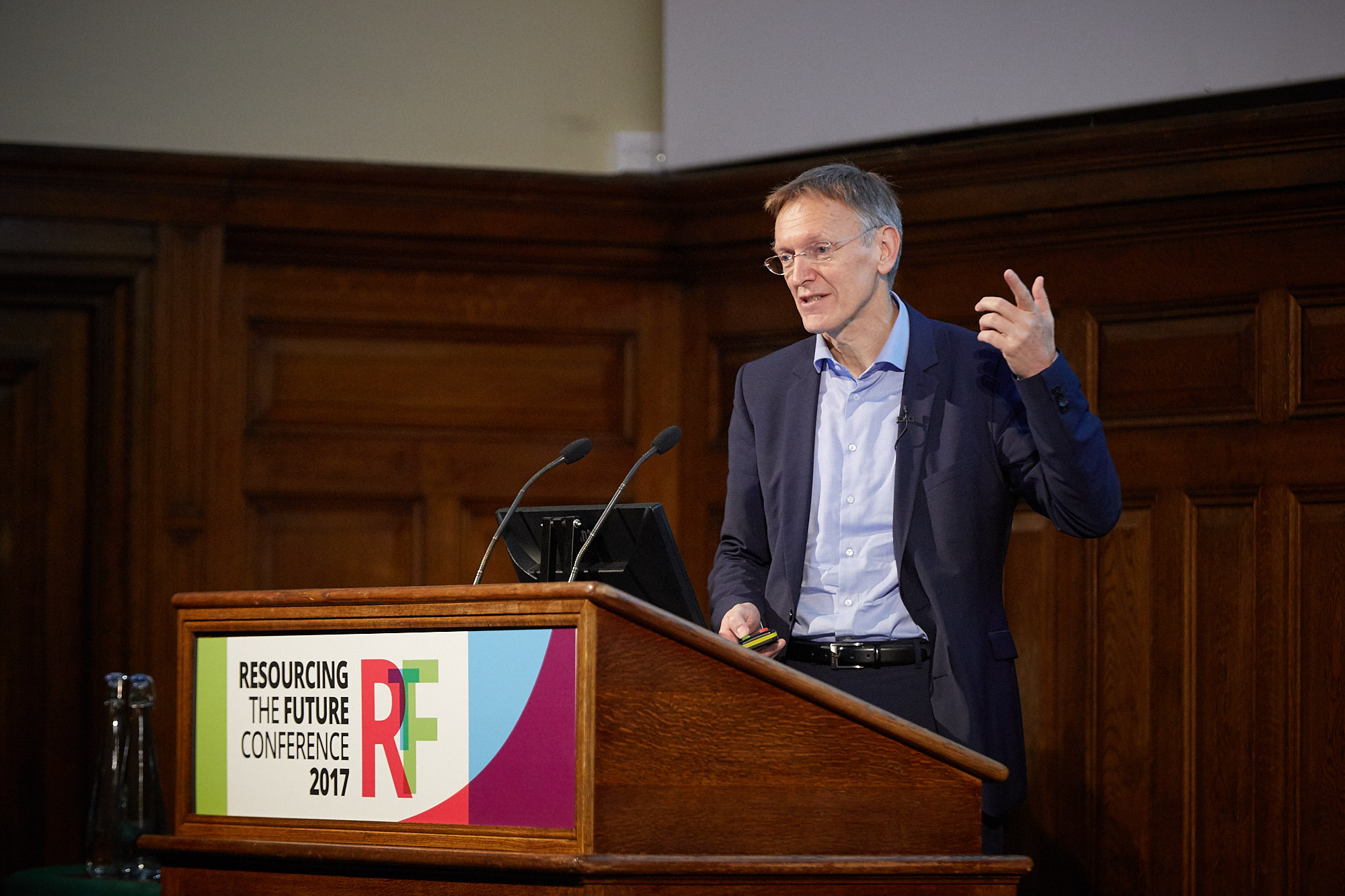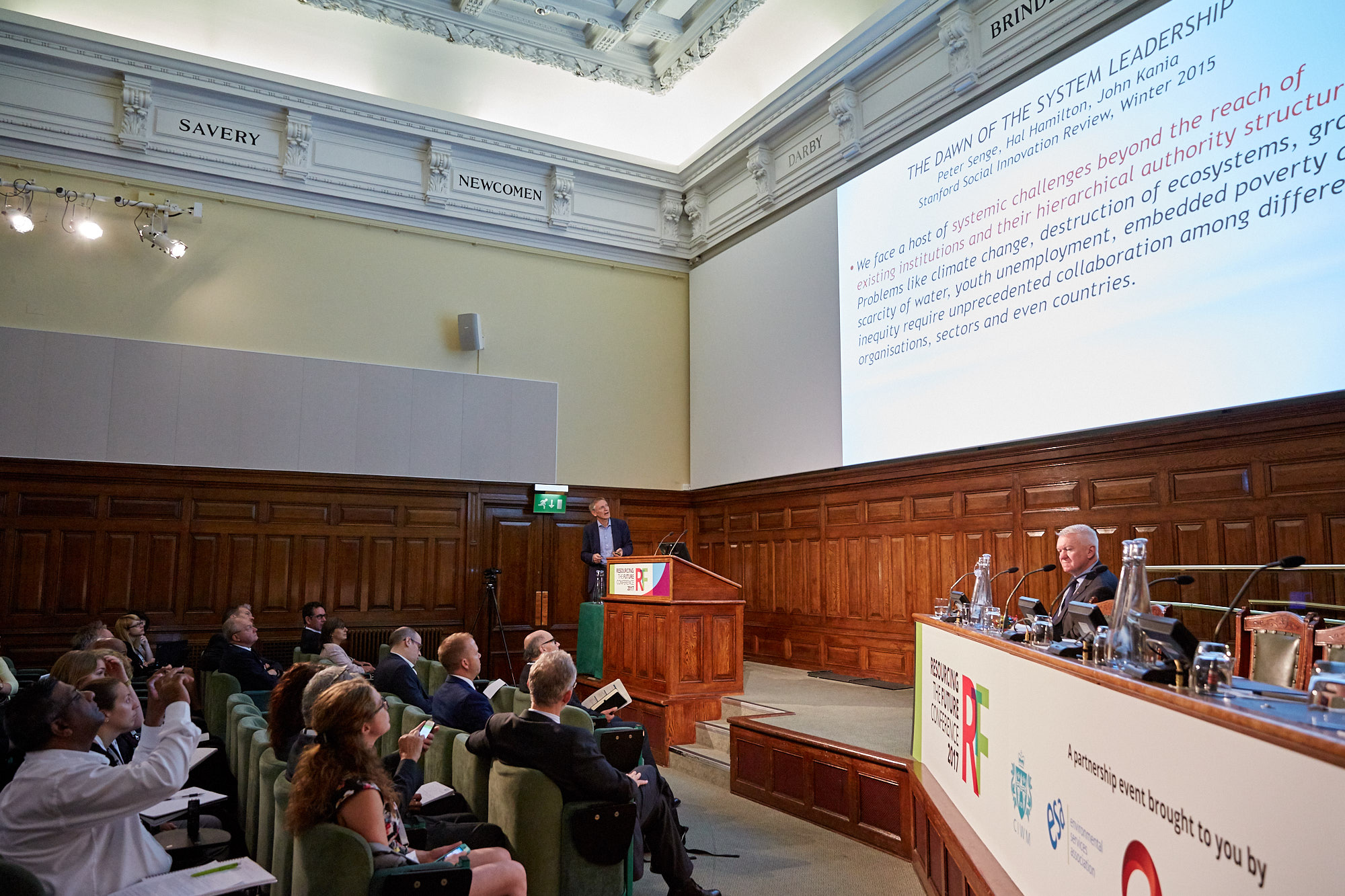
Press Release
29th June 2017
RtF2017 highlights sector’s commitment to keep working towards a resource efficient and productive future
Dr Janez Potočnik, author of the original EU Circular Economy Package and now Co-Chair of UNEP’s International Resource Panel , reminded delegates at the Resourcing the Future 2017 conference yesterday why resource efficiency and productivity has to remain at the top of the agenda.
Giving the keynote address on the second day of the conference – a partnership event between CIWM, ESA, Resource Association and WRAP – Dr Potočnik wove together a number of themes: population growth and how this is effecting resource consumption, the circular economy and the UN’s Sustainable Development Goals, Brexit and globalisation.
There were some stark statistics. By 2050, the global population will have reached almost 10bn, significantly adding to the existing strain on global resources. All of the resources needed for food production are being impacted, he said, adding that a third of all soils are already moderately to highly degraded but yet we throw away one third of the food we produce! Middle class consumption continues to rise, particularly in the rapidly developing economies, and this, more than population growth, has been main driver behind increased material use in the last fifty years so. Indeed materials efficiency has actually declined since 2000, despite growing recognition that we are already exceeding our planetary resource limits.
Other changes, such as increasing urbanisation, add to the challenge he said. Between 2011 and 2013, for example, China used more cement than the USA used during the entire 20th century, and more than 50% of the urban fabric expected to exist by 2050 is still to be built.
The situation exposes the flaws in the current economic model, where financial capital is overvalued, human capital is undervalued and natural capital is not valued at all. By not recognising the “environmental costs”, we are going into debt and defending the status quo is no longer a viable response. There is, he said, a global imperative to develop a new economic model based on ‘responsible consumption and production’ as this underpins everything else. Without leadership from governments, however, he said there will be “no chance” of transitioning to a circular economy future.
The keynote marked the start of a series of thought provoking sessions. In the first session, Dr Marcus Gover from WRAP talked about ‘business unusual’ and explained the organisation’s new paradigm – Reinvent, Rethink, Redefine. Professor Paul Ekins, meanwhile, emphasised the importance of language and challenged the audience to stop being part of the problem; by continuing to talk about waste, which is seen as a cost, we are not engaging politicians in the £billion opportunities on offer. Markets are critical, he said, but they need driving and he echoed Dr Potočnik’s point about the need for political leadership. One of the real disappointments, he added, was the loss of the resource productivity target proposed in the original EU Circular Economy package.
Speakers in the second session, however, made it clear that progress will happen and opportunities will be seized even in the absence of political leadership. Partnerships, greater collaboration and transparency across the supply chain, and a pragmatic attitude to fluctuating markets were highlighted by both Robert Hunt from Veolia and Mathew Prosser from DS Smith. Mike Barry from M&S, meanwhile, said the marketplace, and consumer behaviour, will drive change and it is about challenging things that seem impossible to do. For M&S’s new plan, this means “zero waste by 2025 across all supply chains” and 11 plastic packaging polymers ideally being reduced down to one. Laura Sandys, meanwhile, said the resource efficiency and productivity agenda is ready to be “opened up, articulated and delivered” through the forthcoming Industrial Strategy and that the sector must keep talking about its ‘value’ to the economy to ensure that its voice is heard.
The final session provided some fresh perspectives on realising the opportunities, including insight from Dutch expert Freek van Eijk. He had two strong messages for delegates; firstly that the time to act is now as the Circular Economy will become a regulatory reality, and secondly that this sector has a unique opportunity to position itself as a catalyst for change. He also shared the Dutch Government’s astonishingly ambitious targets to achieve a 50% reduction in the use of raw materials by 2030 and a circular economy by 2050. The importance of place-based approaches and investment and support for businesses with circular economic potential were other themes, from Merseyside’s ambition to become “a place where nothing is wasted” to the recent launch by the London Waste & Recycling Board of their London Circular Economy Route Map, which includes 100 actions and supporting funding for businesses, an important part of enabling change that was further explored by Andrew Shannon, partner at Circularity Capital.
The discussion and Q&As on the second day of the conference also picked up a number of the themes and issues covered on the previous day, including actions needed to maintain momentum on recycling, of which food waste was the one of the top priorities, and future role of Extended Producer Responsibility. The Expert Breakout sessions, a new addition to the event’s format, also gave attendees the chance to debate some of the current challenges facing the sector today. These included smarter ways to tackle waste crime, realising the social benefits of reuse, and how future contracts can better reflect the need for more flexibility and risk/revenue sharing in the future.
Commenting on the conference, which attracted over 260 attendees over the two days, Marcus Gover, CEO at WRAP, said: “Resourcing the Future 2017 provided a brilliant forum to discuss the issues we are facing as well as celebrate the achievements we’ve already made as a sector. Janez Potočnik’s opener to the day really set the scene outlining the global challenges and opportunities as well as the need to act. The potential economic and environmental benefits are huge, and the Conference has shown that we can realise them, so let’s get on with it.”
CIWM’s CEO Dr Colin Church added: “The clear message that came out of this year’s conference is that this sector is committed to shaping and playing an active part in a more resource efficient and productive future. The imperative for more collaboration and partnership working came across strongly – not just to ensure that the significant opportunities are recognised by government in its future policy making but also because addressing the different barriers to progress across the supply chain requires collective effort.”
ESA Chairman Stewart Davies reinforced the positive response from the sector, saying: “The RtF conference has laid out the opportunity ahead for UK plc through choosing the Resource Efficiency route to a more resilient economy and environment. This will require a new level of collaboration across supply-chains and across Whitehall. The sector is ready to engage with Government to make this a reality.”
Ray Georgeson, CEO of the Resource Association, said: “This year’s conference has reinforced how important it is to keep reminding policy makers about the twin benefits to the environment and economy that this sector can deliver, and the partnership working that will be required to fully realise this potential.”
ENDS
Press contacts:
Pat Jennings
CIWM Head of Policy & Communications
Tel: 01604 620426
Mob: 07912 228260
Email: pat.jennings@ciwm.co.uk
Clare Usher
PR Officer - WRAP
Direct Dial: 01295 819678
Mob: 07739 745312
Email: Clare.Usher@wrap.org.uk
Toni Waters
ESA Communications and Membership Officer
Direct Dial: 0207 591 3206
Press Line: 0207 591 3219
Out of Hours Only: 07841 572 834
Email: t-waters@esauk.org

